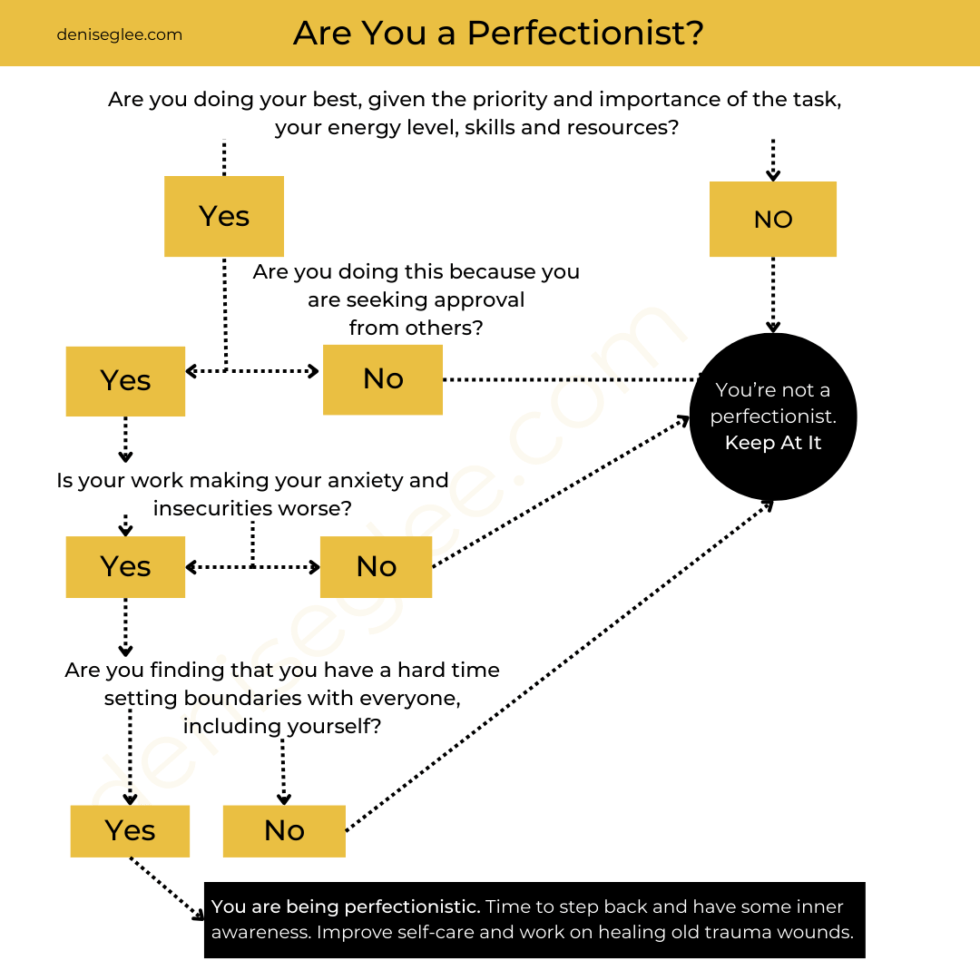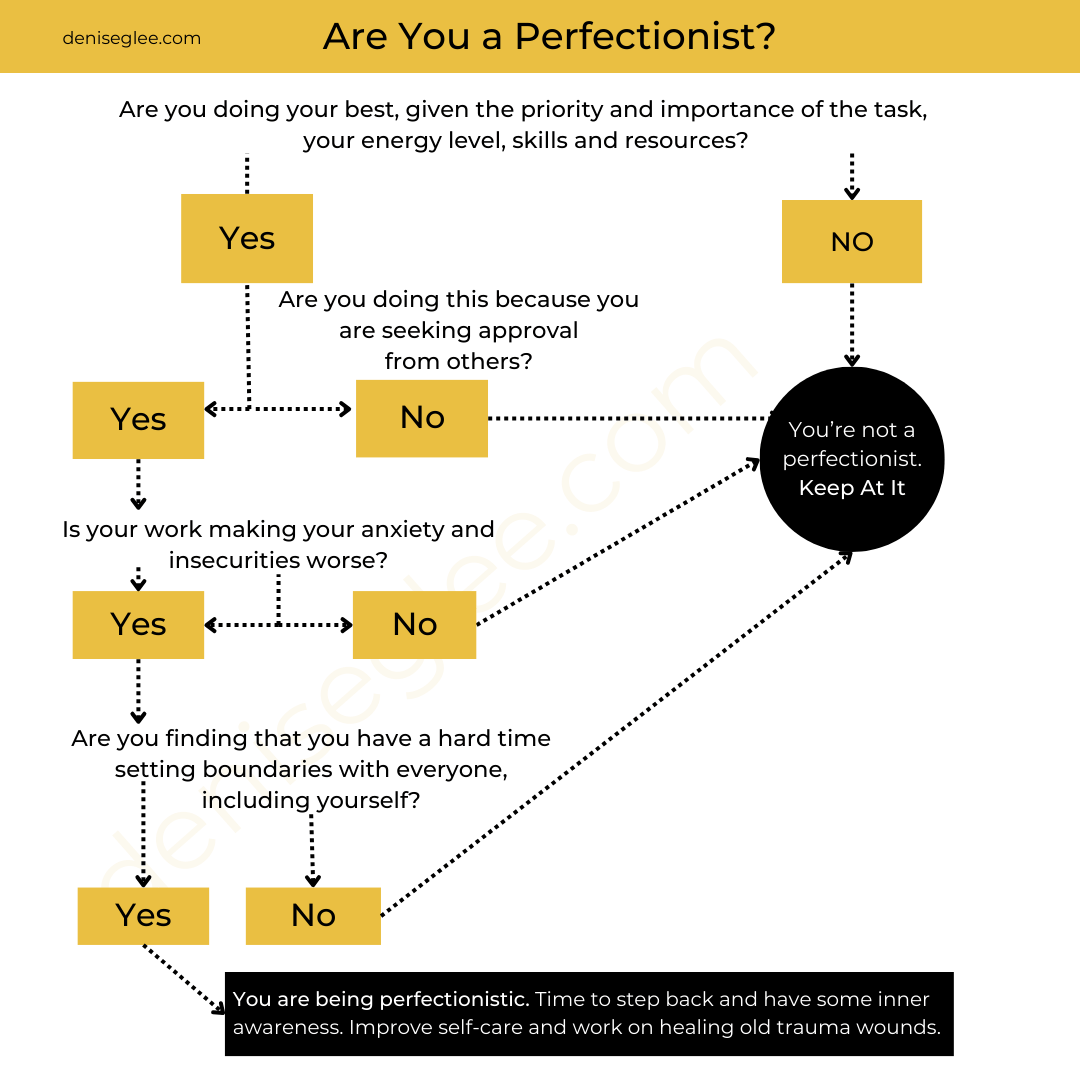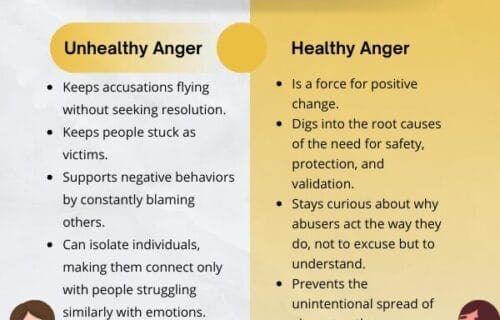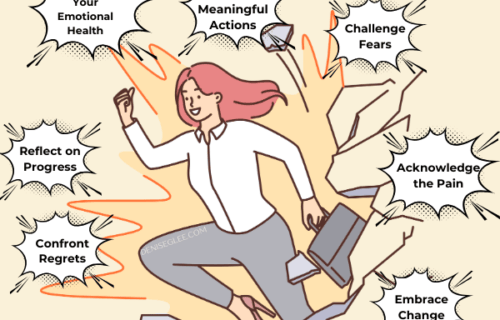
The Perfectionist’s Guide to Overcoming Self-Criticism
- Published:
Do you want people to remember you for doing a great job? Maybe even spend a lot of time trying to fix tiny mistakes that no one notices? While being perfect is usually seen as a good thing, sometimes it can stop us from living a quality life.
As a life coach for entrepreneurs, I’m really into this topic. I know that lots of us make things so hard on ourselves through impossible, yet alluring perfectionist standards.
In this article, we’ll discuss how being a perfectionist as a child was helpful, why this behavior hurts us in our work and personal lives, and I’ll share a story about why it’s important to accept less than perfect in order to preserve our sanity. First, let’s talk about why some of us tend to be perfectionists.
From Scapegoat to Problem Solver to Perfectionist
If you’ve been through abuse, you might have experienced going from being unfairly blamed for everything in a tough childhood to becoming a scapegoat, a problem solver, and eventually, a perfectionist.
As a child, whether it was your parents, teachers, older siblings, or someone powerful, they often put the blame on you for things that weren’t your fault. For instance, they might have said “Jimmy” deserved to get hurt or “Jane” caused Mom to steal.
Being a savior for all. Whether they want it or not.
If you’ve faced such emotional struggles, you might tend to follow one of two paths: avoid taking responsibility, even for yourself, or try to be the savior to anyone around you.
And the reason why is simple – hearing these accusations repeatedly, you might start believing it’s actually your fault. Feeling responsible, you end up working hard not only to fix yourself but also everything and everyone around you.
However, aiming for perfection can hinder anything that is meanwhile and perfect. And the reason why is simple – you always see flaws and want to fix it. If you don’t get exhausted from trying to fix every flaw in your sight, then the people around you are getting exhausted from all your judgments and critiques.
Next thing you know you are doing exactly what you hated as a child. But the programming from your childhood is deep. It might make you feel like you have to be perfect and in control all the time. True healing involves accepting your imperfections and embracing the journey of recovery.
Next, let’s dive a bit deeper into what it looks like to work overtime, not to help others, but to hide one’s inner insecurities.
If you've faced such emotional struggles, you might tend to follow one of two paths: avoid taking responsibility, even for yourself, or try to be the savior to anyone around you.
Denise G. Lee Tweet
Helping Others or Avoiding Inner Insecurities?
Helping others may seem like a good and unselfish thing to do, but it’s important to think about why you want to help. The need to please others can have a big cost.
Here are some questions to consider (yeah, it’s kind of my thing to ask you questions that make you think about your habits):
- Are you really helping others, or are you doing it to avoid dealing with your own insecurities?
- Have you ever found yourself insisting on helping even when someone says no, thanks?
- Do you put off taking care of your own mental, spiritual, and physical needs just to be a hero and save the day?
These questions become even more important when you think about whether your efforts are truly helping both the person you’re trying to help and yourself.
Oh snap….it’s me being CODEPENDENT, again!
If you’re up for answering these questions, let’s talk about codependency. It’s a complex thing where you kind of get tangled up in seeking approval from others. You might even change who you are to fit what others want.
Getting over codependency is a complicated journey. You can’t just say, “They’re in charge of themselves!” It involves challenging deep beliefs, looking at your needs and boundaries, and healing from the inside out.
It takes time, but it’s much more rewarding than making it your full-time job to clean up other people’s problems, which is a common trap of codependency. In the next part, we’ll talk about how you can take back your life and heal from the need to always have everything perfect.
Helping others may seem like a good and unselfish thing to do, but it's important to think about why you want to help.
Denise G. Lee Tweet
Accept, reject, but do NOT tolerate bad situations.
We’ve all been in situations where we knew we should leave, but the fear of being rejected, especially if we like making others happy, held us back.
Sometimes, we put up with things that go against how we truly feel and what’s good for us. All because we want to keep up a good image and avoid rejection.
Taking care of ourselves can be a real struggle, even when we know it’s important. We might ignore our own needs, especially if we’re afraid that putting ourselves first could make others criticize or reject us.
How perfectionistic standards and codependency can sabotage us professionally
Let me share a personal story about why perfectionistic tendencies and fears can cause us to do things we don’t want to do.
A few months ago, I had an podcast interview scheduled with an author. After reading her book, I felt like she was leaving out many important details. I sensed she was defensive about her past but still trying to promote her book.
At that moment, I felt some serious inner conflicts. On one hand, I want to share my story in a book someday, and I wouldn’t want people to criticize my experiences. But if I interviewed her, I’d have to praise her – you don’t interview someone and then criticize their book to their face, right?
Saying NO to others so you can say YES to yourself!
After talking to some friends about this, I realized that going through with the interview would mean giving praise that didn’t match how I really felt.
The fear of rejection, which often comes with perfectionism, had made me hold back on being honest and true to myself. So, in the end, I chose to politely say no to the interview, sticking to my principles.
Now, think about your own life. Are there things you need to let go of? Have you committed to things that don’t match your values? If so, it’s time to be brave and admit that some adjustments are needed for your inner calm and peace.
The flowchart below is a handy reference guide if you feel like you are edging towards perfectionistic tendencies. Next, let me share my final thoughts.

Final thoughts
Trying to be a perfectionist can make life tough, especially when we ignore our inner worries and stay in situations that don’t feel right.
Many of us try to help others while dealing with trying to ignore our own problems. But if we realize how important it is to be honest and take care of ourselves, our journey to get better becomes more meaningful.
It’s okay to focus on our well-being and avoid things that feel wrong. Accepting our imperfections, dropping the desire to be a perfectionist and staying true to ourselves is the key to real healing.
To live a happier lifer, we can recognize what happened in the past and take control of our lives. We don’t have to keep telling ourselves how messed up we are. Instead, we can focus on our strengths and abilities in recovery.
If you are tired of trying to be a perfectionist, feel free to reach out to me.
Also, if you want to learn more about this issue, you can check out this episode from my podcast.





